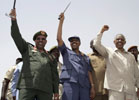
The Sudanese government’s decision earlier this month to expel relief agencies from Darfur and other vulnerable hotspots in northern Sudan is not the first time that President Bashir’s government has deliberately withheld food and medical care from those who need it most. Far from it. As my colleague John Prendergast noted in a recent op-ed, the same regime caused the deaths of hundreds of thousands of people during the war in southern Sudan by manipulating and blocking humanitarian assistance. The Sudanese army’s strategy to depopulate the oil fields in Western Upper Nile from 1999 to 2001 demonstrates just how little regard this regime has for its own citizens.
The government sought to increase oil production in Western Upper Nile to further finance its war machine. That civilians lived atop the oil concessions granted to Chinese companies was viewed as an inconvenience, and the regime launched a military operation to remove them by force. The manipulation of relief flights was an effective complement to government air strikes and ground assaults, and the government denied humanitarians, on average, access to twenty locations per month. These restrictions prevented the World Food Program from providing assistance to populations that faced food shortages ranging from 50 to 100 percent. Yet while the regime denied access to the core of Western Upper Nile, it allowed humanitarians to operate in isolated locations on the border with a neighboring province and in government controlled garrison towns.
This selective apportionment of humanitarian access served three purposes. First, it forced people to abandon their homes. Fleeing violence and hunger, civilians moved to areas where they might actually receive assistance. Second, it hid the human cost of the government’s strategy. Restrictions on access meant fewer outside observers to document atrocities and escalating mortality rates. Third, it killed people in massive numbers. Displaced civilians are more vulnerable to disease and starvation. Sound familiar? It should. These are the conditions facing more than one million displaced civilians in Darfur right now.

